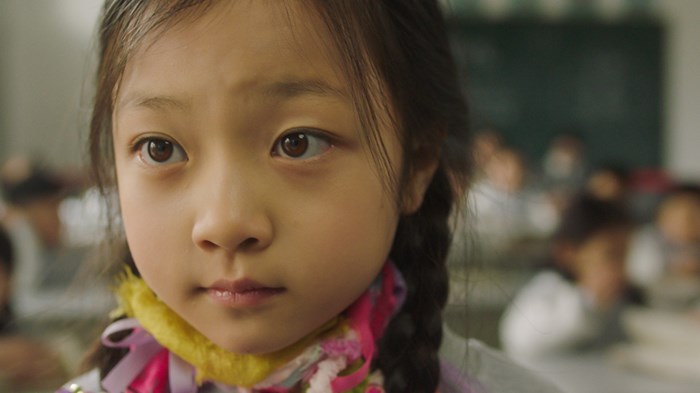One Mother Faces Two Mountains—Immigration and the Educational System—in New Indie Film

The opening scene of Confetti brilliantly sets a tone of frustration for the rest of the movie.
A nicely dressed woman says, “Talk about persistent” and angrily presses play on a voice recorder, on which we hear a different female voice speaking in Mandarin. Clearly annoyed, the woman scoffs: “Is this all in Chinese?”
Unknowingly, the viewers have made judgments within seconds about the first woman who enters the office, as well as the second woman speaking Mandarin on the recorder. We make these judgments based on little to no information about the two women other than a few sound bites, which Hu challenges as the movie progresses. It all sets up the clearly presented themes that can be seen throughout the rest of the film: normal vs. abnormal, the individual vs. the group, judgments, and persistence.
The woman speaking Mandarin on the recording is Lan Chen (played by Zhu Zhu), a Chinese mother who desperately desires for her daughter to be given an opportunity to a better life through education. Zhu, recognizable from Cloud Atlas and Marco Polo, beautifully plays a severely stoic woman who has buried and brushed off hardship she had to suppress in order to survive. On the recording, we learn that Lan’s daughter, Mei Mei (played by a delightful Harmony He) has some type of disability and that the woman listening to the recording is Dr. Wurmer (Helen Slater), the director of an American school that can potentially help her.
The next scenes skip back in time and portray Lan’s life in China before coming to the United States to find a school for Mei Mei. Lan and her husband are faced with an issue that is familiar to so many parents: finding a school where Mei Mei can thrive. It is clear that Mei Mei is very bright, but Lan knows from her own experience that without the proper teaching, her academic and creative abilities will be stifled for the rest of her life. Lan decides against this future for her daughter and makes the difficult decision to leave China and her husband so that Mei Mei can study in America.
This theme of the individual vs. the group resurfaces again when Lan is called into a meeting with a Chinese principal. He says that although Mei Mei is lovely, she is very behind in her studies compared to the other students. Mei Mei is again judged based upon her falling outside of the normal and acceptable standards of the group. There is no allowance for deviance outside of the majority, and therefore there is no room for Mei Mei at the school. We find out that the same thing happened with Lan at her school when she was younger through a flashback. In both Lan and Mei Mei’s life, they were rejected and told to go elsewhere because they were different.
The rest of the movie shows us the new life that Lan and Mei Mei make in America. They go to live with Helen, an older disabled woman who lives by herself and uses a wheelchair. Amy Irving plays Helen deftly, with a rigid yet warmth that comes across the screen very well. Despite Helen’s initial reluctance to take Lan and Mei Mei in, she is won over by them. She becomes inspired by Mei Mei’s special view on the world and obvious bright charm.
Through Lan’s work experiences, the viewers see a common immigrant struggle in the United States. These scenes are all too familiar to many children of immigrants who witnessed their parents toil and labor, often receiving payment under the table. The immigrant struggle is beautifully portrayed here, nuanced but effective. As a mother and daughter of immigrants, I resonated with Lan’s tenderness.
This heartwarming movie displays the unwavering love of a mother for her child and the tenacity she has to give her daughter everything she did not have herself. Parents that have children who have disabilities might also be encouraged and relate with seeing the perseverance of Lan’s advocacy to provide her child the appropriate care and education in order to thrive.
We can also learn a valuable lesson from Mei Mei: sometimes parents or guardians try to fit them into a mold, but the path a child chooses on their own is the best one. Although Lan wanted to spare her daughter from the personal trauma of rejection she experienced, she did not realize that Mei Mei was not affected in the same way she was. Perhaps the biggest lesson we could learn from Mei Mei in Confetti is that being rejected because you fall outside of what is considered normal is not necessarily a bad thing.
Like Mei Mei, maybe we should embrace and welcome being different and celebrate it. It could be the best thing to happen to you in a world that no longer takes the time to see the real beauty before us in everyday and simple things, such as paper confetti dancing along the wind.
To see Confetti now, groups can request to host a screening.
Lora Kwan is committed to walking with marginalized and vulnerable people towards wholeness. Through her pastoral care counseling ministry, she has the privilege of being witness to the restorative power of the Holy Spirit, and the unfathomable love that God has for His children. She seeks to embody Christ to all those that she meets, and cares deeply for people affected by the great injustices present in this fallen world. She hopes to be a peacemaker and bridge for racial reconciliation, as well as a champion for cultural connection. Lora is currently pursuing a Masters degree at Wheaton Humanitarian Disaster Institute.
The Better Samaritan is a part of CT's
Blog Forum. Support the work of CT.
Subscribe and get one year free.
The views of the blogger do not necessarily reflect those of Christianity Today.






















